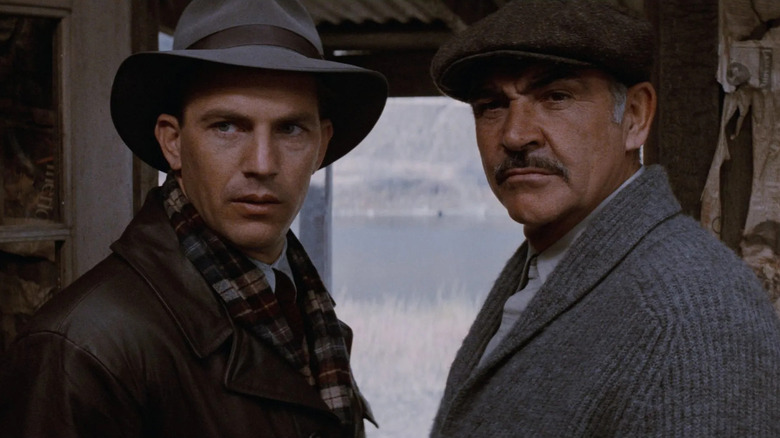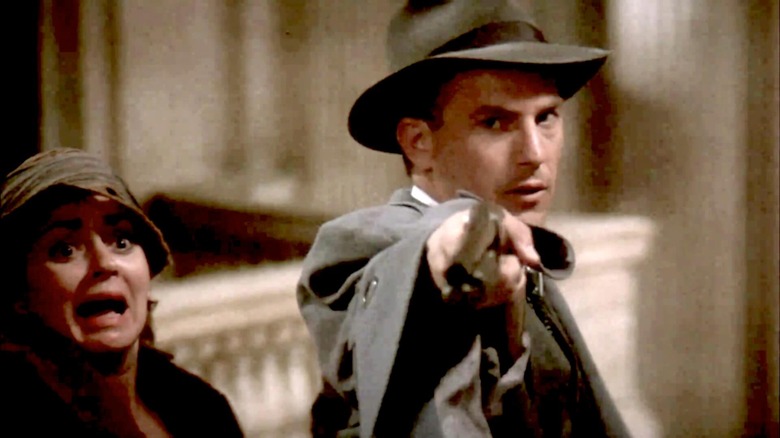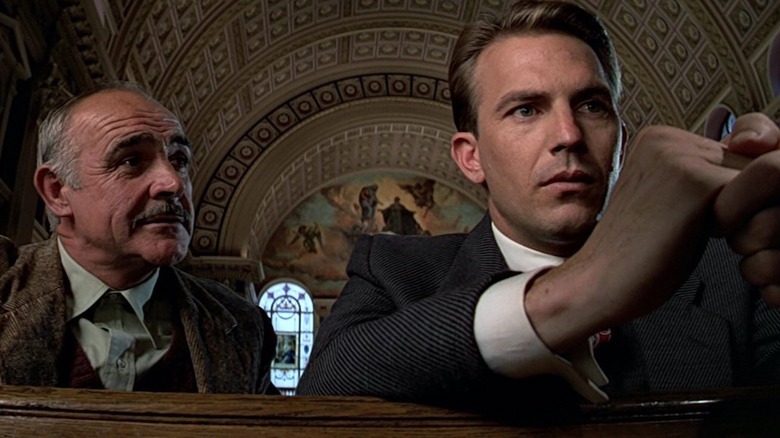Playing Hardball With His Untouchables Casting Paid Off For Kevin Costner
Before 1987, Kevin Costner might've been best known in Hollywood for the movie in which he didn't appear.
Lawrence Kasdan's "The Big Chill" gave just about everyone involved a massive career boost, and probably would've done likewise for Costner had he not been cut out of the film. He played Alex Marshall, the character whose death by suicide brings a group of college friends back together for a fall weekend in South Carolina. Though Kasdan shot flashbacks featuring Costner, he ultimately cut them out of the movie, which became a Baby Boomer favorite.
Costner's bid for movie stardom officially began in 1985, with lead roles in Kevin Reynolds' "Fandango" (another Boomer nostalgia piece) and John Badham's "American Flyers." He also landed a flashy supporting role in Lawrence Kasdan's Western throwback, "Silverado." The first two films not only bombed, they barely received a theatrical release, while Kasdan's movie performed well below the studio's commercial expectations.
Despite these stumbles, filmmakers still believed Costner was going to be a star — as did Costner himself. So when Paramount and director Brian De Palma approached him to play the lead role of Eliot Ness in "The Untouchables," he negotiated like one.
Make it an even million
Costner had just finished shooting Roger Donaldson's superb political thriller "No Way Out" when the offer to play Ness came in. Though the Donaldson flick would go on to be a sleeper summer hit during the summer of 1987, it wouldn't arrive in theaters until two months after the release of "The Untouchables." " So Costner's leverage was based entirely on potential. Paramount knew this, and low-balled him.
Costner had earned $750,000 for "No Way Out," which reportedly cost $15 million. The budget for "The Untouchables" was $25 million, and Paramount expected it to be one of their top summer money-makers. Keep in mind that Paramount was riding high in the mid-1980s thanks to mega-blockbusters like "Beverly Hills Cop," "Top Gun" and, yes, "'Crocodile' Dundee" (second highest grossing movie of 1986, and don't you forget it). They were considered talent-friendly, and could afford to loosen the purse strings a little if it meant avoiding a protracted contract squabble.
Paramount led with an $800,000 offer to Costner, which, to be fair, was probably his going value at the time. In an interview with The Huffington Post, Costner recalls balking at this figure:
"[I] said, 'It's got to be a million.' And they said, 'We can't do it.' And I said, 'Yes, you can.' I got the remaining $200,000 deferred at the point the movie came out, so I got to my million. And I was able to tell my parents, 'Your son, the f*** up, finally did it. It worked out OK.'"
How to succeed in the movie business when you're Kevin Costner
Costner's 1987 combo of "The Untouchables" and "No Way Out" washed away the bitter taste of 1985. In '88, he sent hearts a-flutter as the rakish minor-league catcher Crash Davis in "Bull Durham" and went straight back to the baseball diamond as the aw-shucks Iowa farmer Ray Kinsella in 1989 for "Field of Dreams." Given his audacious ask for "The Untouchables," it shouldn't have come as a surprise that he'd quickly parlay his success into a three-hour frontier epic that, aside from seeming awfully uncommercial on the page, also served as his directorial debut. Amazingly, he won Best Picture and Best Director for the zeitgeist-y "Dances with Wolves" in the year of "Goodfellas."
Costner's chutzpah would get him in trouble from time to time (especially when he attempted to valorize the delivery of mail via the post-apocalyptic framework of "The Postman"), but his confidence is nevertheless inspiring. Costner continues to wager that there will always be a market for his services, particularly if baseball or horses are involved, and people will pay for the pleasure of working with him.


